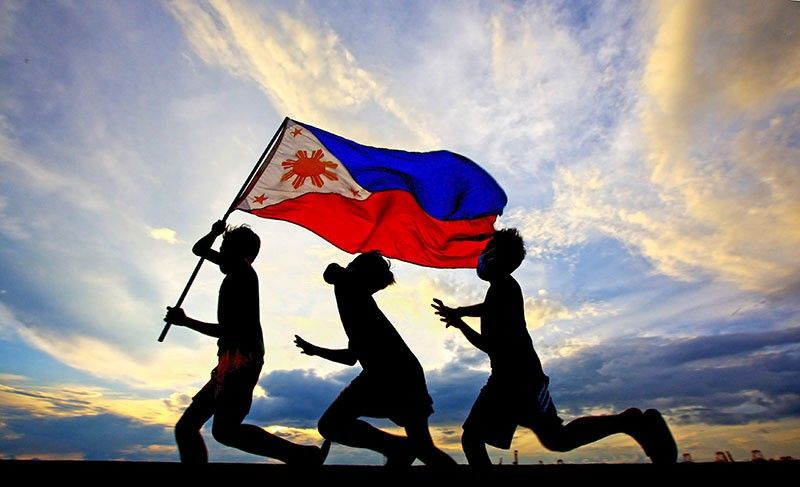Commentary: Philippines moving forward

We no longer celebrate our Independence Day on July 4. We had it moved to June 12, since the mid-1960s. Nonetheless, it should be well worth reckoning that we have been an Independent Republic for 75 years (i.e. since July 4, 1946). This should be an appropriate occasion for us to assess what we have really accomplished—more or less on our own—without American colonial administrators hovering over us, these past seven and a half decades of independence.
Another fateful event recently struck us, the passing away of former President Noynoy Aquino. This should make us pause.
He and his mother before him did so much for our country and our people: she restored democracy and re-established its institutions; and he brought our economy up to investment grade status, thereby earning much needed respectability for Philippines and the Filipino people.
Respectability may not be a bitcoin or any material currency. But it is a treasure that we may have squandered away: it is one that we must regain, as we think forward, and move towards 2022 and the many years ahead of us, hopefully after we have put the pandemic behind us.
We can regain much of the respectability that we may have lost, and which the two Aquino presidents did so much to win for us, if we give much greater importance to our national governance.
This means, among other things, choosing national leaders who not only have the competence to follow the discipline of good governance, but also the moral standing to ask for responsible citizenship from all Filipinos.
This all sounds so high-flown. But what it means in practical terms is this: the character of the leaders we choose does matter! And character starts with having and actually observing “good manners and right conduct.” This is what we ask of everyone; it is a minimum that we ask of those who would lead us.
For our sake and for the cause of the Philippine future, moving forward to Dream Philippines 2040, this is what we should demand of people who put themselves forward for elected positions, most especially the highest positions of our land.
Do we really need any guidance in judging the character (as well as the heart and mind) of candidates running for national office? If we think we do, we need to look no farther than the life and example of the two Aquino presidents, Cory and Noynoy. They provide a practical guide on how to choose a proper character fit for national office.
Any other governance guidance we may need—beyond making a judgment on the character of candidates—is already laid out in the forthcoming book to be released on July 30, 2021. It's entitled “Governance of the Philippines: as an Independent Republic, 1946-2021”.
The book is thick, as befits the long period it covers, the 75 years we have been journeying on our own as an independent Republic. But it has been written for any college-educated Pinoy, with a deep interest in helping ensure that our elections in 2022 can make a positive difference for the next generation of Filipinos.
How may ordinary Filipino voters make such a positive difference for our collective future? The straightforward answer is this: by thinking about the elections next year and beyond.
Indeed, the main governance lesson that the book brings out is that focus on voting and on elections represents only the first step. This has to be followed up by subsequent steps, taken in between election periods.
Indeed, what happens after May 2022? What do ordinary citizens have to do after the national elections? How must responsible citizens act so we all take the fate of our country into our own hands, and not leave it almost completely in the hands of elected officials?
Answers to these questions are provided in “Governance of the Philippines: as an Independent Republic, 1946-2021.” Finding out some of the answers may not be enough. It is also necessary to act on them. We all need to act.
This is the reason why, along with releasing the book, we are also launching the Community of Governance Advocates. This is made up of ordinary Filipinos who would bring the governance discipline into their personal life, their respective families and places of work, and also into their local community as well as into our collective national sphere, our beloved Philippines that the two Aquino presidents did so much to bring up to higher levels of respectability.
Let Philippines and the Filipino be respectable and respected again!
Dr. Jesus P. Estanislao is a Filipino economist recognized as the country’s foremost authority on governance. He spent his career rehabilitating institutions in the public and private sectors, which led to his eventual founding of the non-profit governance reform institutes the Institute for Corporate Directors, Institute for Solidarity in Asia and Center for Excellence in Governance.
He is the author of several books on governance including, Governance in the Philippines: Spanish colonial rule, 1565–1898, Governance of the Philippines: the US Colonial Period 1898–1946, and his latest work, Governance of the Philippines: as a Republic, 1946–2021.
- Latest



























